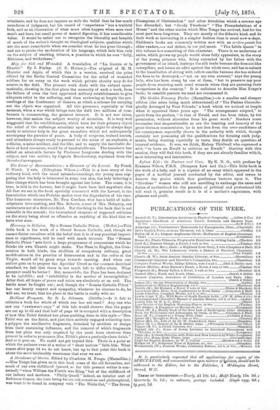much of our own childhood (passed, as far this present
writer is con- cerned) "when William the Fourth was King," but of the childhood of our fathers and mothers. "Philip Quarll " indeed, an inferior sort of Robinson Crusoe, the hero being far too self-conscious and philosophical, was wont to be found in company with "The White Cat," "The Seven
Champions of Christendom" and other frivolities which a severer age has discarded ; but " Goody Tweshoes " " The Perambulations of a Mouse" and the other stories which Miss Yonge has revived, had for the moat part been forgotten. They are mostly of the didactic kind, and do their work at instructing in a simpler fashion than is usual now-a-days. Children's books are commonly written now with an arribre pens& for older readers,—a sad defect, in our jadjment. " The Little Queen " in this volume has something of this character. There is an undertone of satire, which grown-up people would alone fully appreciate, in the story of the young princess who, being entrusted by her father with the government of an island, destroys the silk trade because she does not like caterpillars, and issues an edict against the whole race, and has to submit to the humiliation of sitting with tallow-candles because she has ordered the bees to be destroyed,—" not on my own account," says the young lady, who has been stung by one of them, "but to preserve my poor people from receiving such cruel wounds when they are pursuing their occupations in the country." It is sufficient to describe Miss Yonge's book; to sensible parents we need not recommend it.






























 Previous page
Previous page